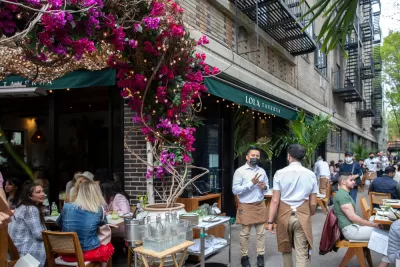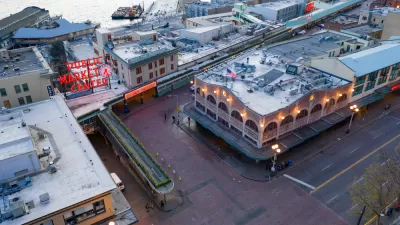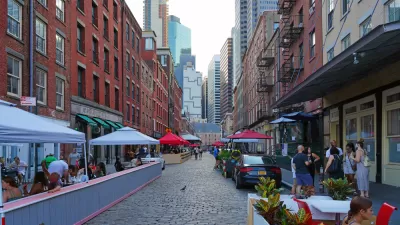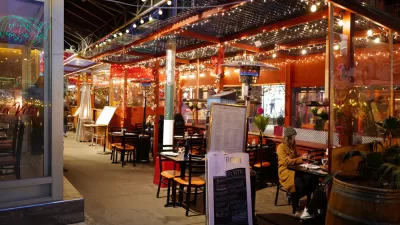Started as a response to pandemic restrictions, al fresco dining has taken off as customers, restaurant owners, and city officials realize the social and economic benefits of outdoor dining spaces.

In a paywalled article in the Boston Globe, Yvonne Abraham describes the persistent popularity of the outdoor dining programs that proliferated during the pandemic. As Abraham points out, “The trend is evolving well beyond the stopgap measures of construction barriers and plastic cones. Five-star hotels and Michelin-starred restaurants are transforming it from shabby to chic.”
And the form is evolving: “It’s taking the form of pop-ups, picnics, cocktail gardens, and poolside dining. Gourmet cuisine is being offered up in caves, heated yurts, and converted ski gondolas, and on tables in the shallows of the ocean.” Restaurants are making creative use of nearby spaces to create entirely unique experiences and an added draw for tourists.
According to the National Restaurant Association, forty percent of consumers say they’re more likely to choose a restaurant with outdoor seating. Many restaurants that began with temporary seating installations that were broken down at the end of the night are shifting to more permanent designs. Even as fears of COVID-19 subside, customers seem to enjoy the diversity of options offered by al fresco dining, and cities have started to extend programs slated for termination and relax rules related to outdoor dining facilities.
FULL STORY: Pull up a chair: Outdoor dining isn't going anywhere

Alabama: Trump Terminates Settlements for Black Communities Harmed By Raw Sewage
Trump deemed the landmark civil rights agreement “illegal DEI and environmental justice policy.”

Study: Maui’s Plan to Convert Vacation Rentals to Long-Term Housing Could Cause Nearly $1 Billion Economic Loss
The plan would reduce visitor accommodation by 25% resulting in 1,900 jobs lost.

Planetizen Federal Action Tracker
A weekly monitor of how Trump’s orders and actions are impacting planners and planning in America.

Waymo Gets Permission to Map SF’s Market Street
If allowed to operate on the traffic-restricted street, Waymo’s autonomous taxis would have a leg up over ride-hailing competitors — and counter the city’s efforts to grow bike and pedestrian on the thoroughfare.

Parklet Symposium Highlights the Success of Shared Spaces
Parklets got a boost during the Covid-19 pandemic, when the concept was translated to outdoor dining programs that offered restaurants a lifeline during the shutdown.

Federal Homelessness Agency Places Entire Staff on Leave
The U.S. Interagency Council on Homelessness is the only federal agency dedicated to preventing and ending homelessness.
Urban Design for Planners 1: Software Tools
This six-course series explores essential urban design concepts using open source software and equips planners with the tools they need to participate fully in the urban design process.
Planning for Universal Design
Learn the tools for implementing Universal Design in planning regulations.
Caltrans
Smith Gee Studio
Institute for Housing and Urban Development Studies (IHS)
City of Grandview
Harvard GSD Executive Education
Toledo-Lucas County Plan Commissions
Salt Lake City
NYU Wagner Graduate School of Public Service





























